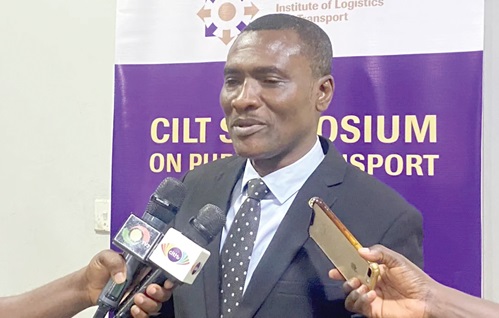
Design policies to put human needs at centre of transport sector — CILT President
The President of the Chartered Institute of Logistics and Transport (CILT), Ghana, Mark Amoamah, has charged policymakers to design policies that place human needs at the centre of transportation planning in the country.
He said the importance of public transport could not be overemphasised as it played a critical role in ensuring accessibility and mobility to all, including the vulnerable and disadvantaged groups in society.
“It is the backbone of any thriving economy, and its effectiveness significantly contributes to socio-economic development.
Therefore, it is crucial for policymakers to design policies that place human needs at the centre of transportation planning,” he said.
Mr Amoamah made the call at the CILT Symposium on Public Transport in Accra last Wednesday.
It was on the theme: “A review of Ghana's Public Transport System: Moving from Vehicle-Centred Policy to Human-Centred Policy".
Essential
Mr Amoamah said it was essential to recognise the challenges facing the public transport system, including the prevalence of unsafe driving practices leading to accidents, among others.
He said it was evident that those challenges affected the quality of life of people, particularly the inadequate infrastructure and coordination among the vulnerable and the disadvantaged.
“Through improved infrastructure, effective coordination, stakeholder engagement and technology, we can create a sustainable and accessible public transport system that caters for the socio-economic needs of Ghana's population,” he said.
In his presentation, the Executive Chairman of AB& David Law firm, David Ofosu-Dorte, reemphasised the need for the ministries of Roads and Highways and Transport to be merged into one ministry for effective coordination.
Mr Ofosu-Dorte said the two should be merged into the Ministry of Roads and Transport to take care of the sector.
Recommendation
“I need to emphasise that we need to have one oversight ministry bringing all these transport modes together, so I would reemphasise my MRT recommendation,” he said.
He said the lack of coordinated thinking was not only at the ministry or the transport sector level, but most of the state agencies also tended not to talk to each other or created turfs.
“That is the reason why I still insist that we ought to go back to what was done in 1998.
What happened in 1998, similar observations were made similar studies were made.
I happen to have been the legal specialist on one of those projects,” he said.
Agencies
“At the end of all these studies… all the transport agencies were brought together under what was called the Ministry of Roads and Transport (MRT).
The idea about MRT was to have one place where the infrastructure, the operators and everybody were in one place and coordinated.
Why we broke it up I still don’t understand,” he said.
He said it was important to go back to that system and added that Ghana was not like India where the railway alone was such a massive sector that there was a need for a ministry for it.
Even at the peak of the railway in the country, he said there were only 963 kilometres of rail line in the country and that for the country to create a ministry dedicated to those sectors beat his imagination.
He said with the agencies coordination like a one-stop shop, it would help solve a lot of the problems in the sector and added: “If the recommendation is taken forward, I think we should consider bringing these ministries together, especially if we want to reduce the size of government also”.
Another recommendation, he said, was the need to pay a lot of attention to the soft aspect of the operation of the transport sector.
“I think the nature of some of our roads, the best way to look at them is to consider trams.
The essence of tram transport is that it helps us to integrate both the road and mass transit of electric vehicles looking like trains in the same space,” Dr Ofosu-Dorte stated.
